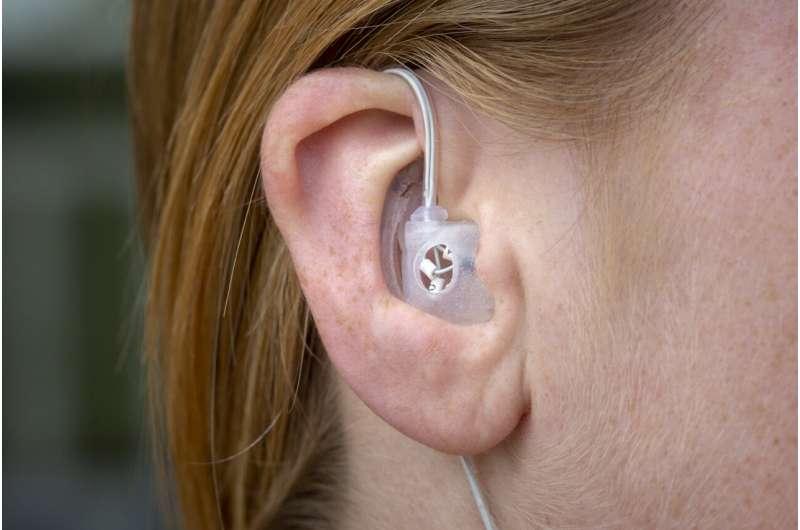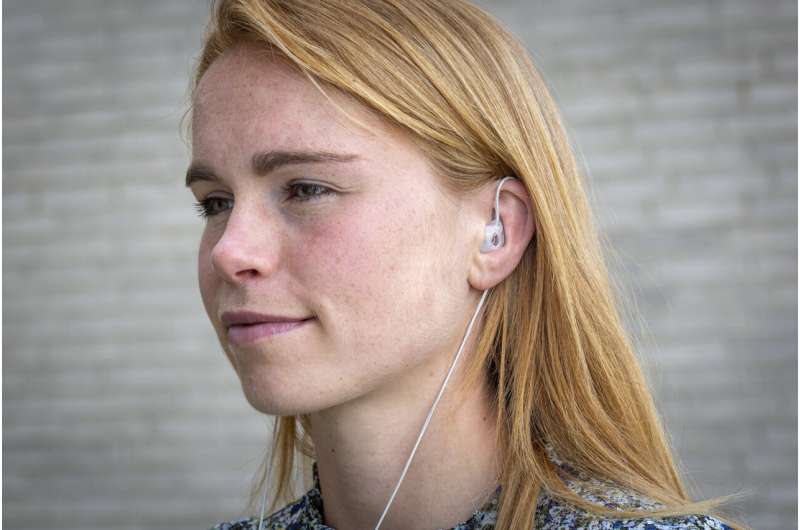Smart earbud will measure how astronauts sleep

Sleep is important for our health and well-being, and bad sleep can negatively impact our attention span, memory, decision-making skills, creativity and judgment.
Astronauts living in zero gravity with an artificial day-night cycle have trouble maintaining a natural circadian rhythm and normal sleep patterns. In fact, sleep is what astronauts complain about the most.
To avoid the negative short- and long-term side effects of poor sleep, Aarhus University's Centre for Ear-EEG has developed a technology that can monitor an astronaut's sleep in a non-invasive and discreet manner via so-called "ear-EEG" (ear-ElectroEncephaloGraphy). The technology, along with Danish astronaut Andreas Mogensen, will travel to the International Space Station ISS to examine the differences between human sleep patterns on earth and in space.
The project is called "Sleep in Orbit."
"Sleep is a kind of biomarker for our health and well-being. In fact, a great many diseases also impact the way we sleep, including a wide range of psychiatric disorders and neurodegenerative diseases. In general, however, there is no clear correlation between experienced sleep quality and physiological sleep. But physiological sleep is what's crucial to our cognitive functions," says Professor Preben Kidmose, head of Aarhus University's Center for Ear-EEG.
He continues, "These days, we know a bit about how astronauts experience sleep in space, but we don't know much about how space affects their sleep physiologically. That's one of the things that we're going to measure as part of this project. And it's also our job to analyze sleep patterns and find the differences between how an astronaut sleeps on Earth and how they sleep in space."
The ear-EEG is a small apparatus that is placed in the ear to measure electrical activity in the brain. Ear-EEG measures extremely small voltage changes on the surface of the skin inside the ear caused by electrical activity in the brain's neurons.

Sleep stages are, by definition, related to brain states, and these can be assessed based on the brain's electrical signals.
"We've been working on developing ear-EEG technology for more than 15 years as a way of measuring electrical activity from the brain outside a laboratory. And it turns out that ear-EEG is extremely good at characterizing our sleep. This technology gives us a unique opportunity to conduct long-term measurements of brain activity. And that means we can begin to study things that we otherwise wouldn't be able to measure. For example, we don't really know much about how our sleep varies over time, and how it's affected by our surroundings," says Preben Kidmose.
The shielded and discreet placement of the device makes the method more attractive than traditional EEG measurements that use electrodes placed on top of the head.
Thus, ear-EEG is far gentler and less obtrusive than traditional sleep measurements, and this makes the technology ideal for long-term monitoring of sleep patterns without disrupting a person's sleep.
"This project is important because in the future, we'll probably be in space a lot more often, and have to stay there for longer. And it's important to understand how it affects our sleep. And being able to make a precise physiological characterization of the sleep will also help us find out how we can help astronauts get a better night's sleep in space. Professor Kidmose's technology is a classic example of how technical sciences develop solutions that help people. I really look forward to following the progress of the project," says Eskild Holm Nielsen, dean of the Aarhus University Faculty of Technical Sciences.
The project, "Sleep in Orbit," will examine the differences between sleep patterns on earth and in space by using ear-EEG-based sleep monitoring to ensure the best possible living and working conditions for astronauts.
Aarhus University will provide the project with the measuring equipment used to measure ear-EEG, as well as the algorithms that will be used to calculate sleep stages. The actual data analysis will be conducted at Aarhus University.
Provided by Aarhus University





















